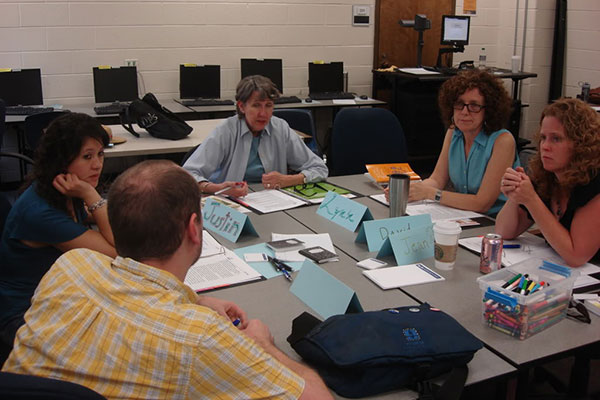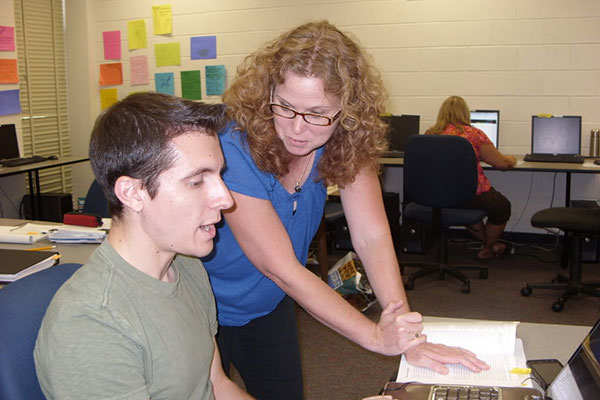Professional Development Presentations
The presentations below are examples of professional development that was tailored
to the needs of specific schools and districts. Contact KMWP if you are interested
in developing learning opportunities for your teachers facilitated by Writing Project
fellows. E-mail Dr. Jennifer Dail at jdail1@kennesaw.edu
Culturally Relevant and Sustaining Pedagogy
Devereaux, Michelle. (June, 2013). Culturally Relevant Pedagogy: What Is It and How Do I Use It? Area Two (Cobb County) KMWP Summer Institute. This session detailed what Culturally Relevant Pedagogy is and offered ideas for implementing this pedagogy in the classroom.
Devereaux, Michelle. (April, 2013). Culturally Relevant Pedagogy: What Is It and How Do I Use It? Campbell High School Professional Development, Literacy Team. This session detailed what Culturally Relevant Pedagogy is and offered ideas for implementing this pedagogy in the classroom. Additionally, this session explored language variation in the classroom and how to support the movement from student discourse to writing.
Devereaux, Michelle. (January, 2013). Culturally Responsive Pedagogy and Writing. Rome RESA Professional Development. This session detailed what Culturally Relevant Pedagogy is and offered ideas for implementing this pedagogy in the classroom. Additionally, this session explored language variation in the classroom and strategies for using language differences as an instructional beginning.
Devereaux, Michelle. (August, 2012). Culturally Relevant Pedagogy in Our Classrooms. KMWP Summer Institute. This session detailed what Culturally Relevant Pedagogy is and offered ideas for implementing this pedagogy in the classroom.
Language Varieties and Classroom Discourse
Devereaux, Michelle (August, 2013) Code-Switching and Contrastive Analysis: Using Students Strengths to Build Bridges. Campbell High School. This session covered the form and function of non-Standard American dialects. It detailed applicable strategies designed to respect the dialects students come to class with while offering them access to Standard English.
Literacy Across Content Areas
Huie, Mary Lynn. (July, 2013). Getting Technical about Literacy: Embedding the Common Core Literacy Standards in the Technical Education Curriculum. GACTE (Georgia Association of Career Technical Education).
Huie, Mary Lynn. (May, 2013). Literacy Design Collaborative Training for Curriculum Specialists and Literacy Coaches. GACIS (Georgia Association of Curriculum and Instruction Specialists).
Huie, Mary Lynn. (July, 2013). New Literacy and Math Standards: Implications for Teaching and Learning. SREB Networking Conference on Common Core, Charlotte, NC.
Huie, Mary Lynn. (March 2013). Literacy Design Collaborative: Tools for the Common Core. GASSP (Georgia Association of Secondary School Principals).
Reading Instruction
Woodall, Maya. (Spring, 2013). Close Reading without Compromise. KMWP Literacy Conference. Teacher participants were guided through the close reading strategies of Beers and Probst’s Notice and Note. Teachers participated in a guided lesson of this strategy to help them learn how to help students notice and note the reoccurring text features/signposts and facilitate closer reading and analysis.
Visual/Multimodal Comprehension and Composition
Crovitz, Darren. (2013). “Weigh the meaning and look not on the words”: Inference and Argument in Visual Texts. Cobb County School District: Three 60-minute workshops dealing with the potential of Norman Rockwell’s painting as complex texts in the classroom.
Crovitz, Darren. (June 2013). Imagining the Impact of Images. Cobb County Area 2 Summer Institute. 90-minute workshop for teacher participants on visual scenario-based teaching possibilities.
Crovitz, Darren. (August 2012). Scenario-Based Activities and Critical Thinking. Kennesaw Mountain Writing Project workshop, Cobb County School District. Three 60-minute workshops for teacher participants on visual scenario-based teaching possibilities.
Vocabulary Instruction
Crovitz, Darren. (May 2013). Approaches to Vocabulary Instruction. Campbell High School. 90-minute workshop for 20 teacher leaders on strategies for vocabulary development.
Crovitz, Darren. (January 2013). Source-Based Vocabulary Development. Rome Educational Service Agency. Two 75-minute workshops for 20 teachers on strategies for vocabulary development.
Writing Instruction
Devereaux, Michelle (July, 2013). Power, Society, and Identity: Keys to Tactful Writing. Youth Writing Academy, Campbell High School. In this session students learned how an awareness of power, society, and identity can strengthen their writing.
Devereaux, Michelle (January, 2013). You Have to Talk the Talk Before You Write: Using Discussion as a Bridge to Writing. Rome RESA Professional Development. This session detailed a variety of discussion strategies and explored how to help move students from discourse to writing.
Drew, Kitty, & Mary Ann Stillerman. Write with a Camera: Capture Images and Convey Ideas through Cinematic Writing. Tap into your students’ interest and familiarity with visual media and show them how to write with a cinematic lens. Use strategies in a writer’s workshop mini-lesson, make them available in an anchor writing activity, or incorporate them into an interdisciplinary unit.
Rish, Ryan. (August, 2013). Developing rhetorical dexterity with argumentation. Cobb County Professional Development Day. In this presentation, Ryan led English teachers in considering the role of warrant in argumentation within and across disciplines/subject areas. Argumentation is considered not as an autonomous skill, but rather as a situated literacy practice within a particular social and/or disciplinary domain.
|










